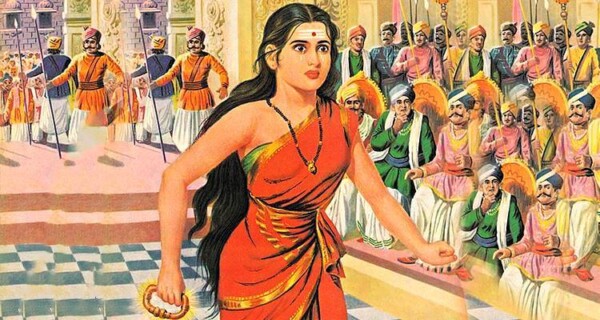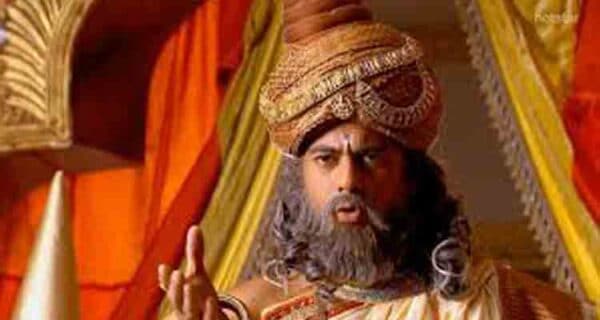Kannaki is the famous heroine from the Tamil epic Shilappadikaram. It is a story of a woman and her husband as they struggle with the problems of fidelity, right and wrong, and justice, written by a Jain monk, Ilango Adigal. Besides many unique things, this might be the only epic which has a female hero and the story rests completely on the shoulders of Kannaki, from the beginning to the end.
The entry of the other woman in Kannaki’s life
Table of Contents
Kannaki is married to Kovalan, the son of a wealthy merchant and both live happily till a woman enters Kovalan’s life. Kovalan is enchanted by Madhavi, a courtesan, who is well-versed with all the arts and considered to be from the lineage of Urvashi the celestial apsara. Kovalan leaves his wife and begins to live with Madhavi at the cost of his reputation and wealth. Madhavi’s mother, only concerned with the wealth, misses the fact that her daughter has begun to fall in love with Kovalan, which is not what courtesans should do.
Due to some misunderstanding with Madhavi, Kovalan leaves her and returns to Kannaki. An empty house and loss of reputation and credibility have left his family poor. But Kannaki accepts Kovalan and both decide to start a new life, with the help of Kannaki’s anklets, the only possessions left to them. They decide to relocate to Madurai and start life afresh.
The jinxed anklet
On reaching Madurai, Kovalan decides to sell one of the anklets. Unfortunately he comes across the royal goldsmith, who has stolen a similar anklet of the Queen of Madurai and is looking for a scapegoat to shift the blame on to. He conspires against Kovalan, and before Kovalan realises it, he is killed by the King’s soldiers.
When Kannaki hears this, she barges into the King’s court and shows the other anklet, and proves that the king had erred in his judgement. She chastises the king for his misdemeanour, which leads to the King giving up his life, followed by the queen.
Not satisfied, Kannaki curses the city of Madurai, which she was intending make her home, to burn to ashes and the city goes up in flames, sparing none but the poor and the innocent.
Related reading: Love in the Mahabharata: An instrument for change and for revenge
What happened after Kannaki burnt Madurai?
Her fury subsides only when the goddess of Madurai convinces her that all that happened to her was the result of karma. She cremates her husband and later joins him in heaven.
Kannaki was deified over a period of time and her popularity is no less in modern times. She is revered as Goddess Kannaki in Tamil Nadu, as Kodungallur Bhagvathy and Attukal Bhagvathi in Kerala, and as Goddess Pattini in the Sri Lankan Buddhists, while the Sri Lankan Tamil Hindus worship her as Kannaki Amman. All over the South and through the route that she took from Puhar in Tamil Nadu (which is supposed to have been submerged during a later tsunami) to Madurai to Kerala, one can find shrines and temples dedicated to Kannaki.
She’s a beacon of hope
What makes Kannaki so special? She is loyal to a fault, and if we see it in its social milieu, what choice did she have? She was a child, given away in marriage. Her financial situation was deteriorating, she had old in-laws who supported her, but couldn’t do much against the trouble that their son had left them in. What choice did she have, except to have faith in her own love?
Step out of our modern metropolis and you will see scores of women enduring such lives. Often we have heard that faith can move mountains and in Kannaki we see that belief. She ends up being a beacon to many such women, who hope that one day, their husband will see sense.
Could it be the power of love?
Related reading: What are your legal options when breakup leads to revenge porn?
Not the usual epic woman
Kannaki is different from the likes of Sita and Draupadi. Though Sita’s kidnapping led to the burning of Lanka and Draupadi’s insult led to the burning of Hastinapur, by their husbands in both cases, Kannaki caused the burning of Madurai, on her own. She did not need a man to unleash havoc on the city that was responsible for her husband’s death.

Finally, Kannaki stays mum in the face of all personal adversities, but chastises the king for his single act of misdemeanour and injustice.
Her anger is not appeased by the king giving up his life, and she goes on to avenge the injustice from the city itself, through what she refers to as an ‘act of purification’.
This goes on to highlight a very strong principle: Transgression by an individual in a personal capacity might be tolerated, but that by a public figure, not least a king, cannot be tolerated, and such transgressions will have to be paid for with life and more. A very strong statement made in those days, but still hugely relevant.
NB: My latest book, Kannaki’s Anklet, is an effort to bring the Tamil epic Shilappadikaram to a larger audience and in a relatively easy prose format.
Related reading: Oh My God! A take on Sexuality in Mythology by Devdutt Pattanaik
Ask Our Expert
You must be Logged in to ask a question.























If i have to pluck the right words , then i have grown up in the laps of myths. As a children i used to read stories of Indian mythology all the time with a profound love and sincerity. And as a young woman, i get glued to the novels dealing with the reconstruction of myths. And, i was not aware of Kannaki’s awe-inspiring tale. Thank you for bringing this into light and broadening my knowledge.
Thanks for appreciating this tale. Unfortunately, this story is not very well known beyond a few states in South, despite being one of the gems of the Sangam literature. Do read my book, “Kannaki’s Anklet”, published by Indus Source Publications and do feel free to send me your views on the same!
I would certainly love to read the book. I will definitely come back to you after reading it. 🙂
“Not the usual epic woman” — I am unable to understand these words may be my wisdom is not sufficient to understand your celestial words. I feel in the case of kannagi she took the act of burning the city because her husband ( man ) is already dead otherwise it would be similar because that’s how it needs to be.
And I feel a kind of ultra modern(western) gene in your writings. Keep it up!!